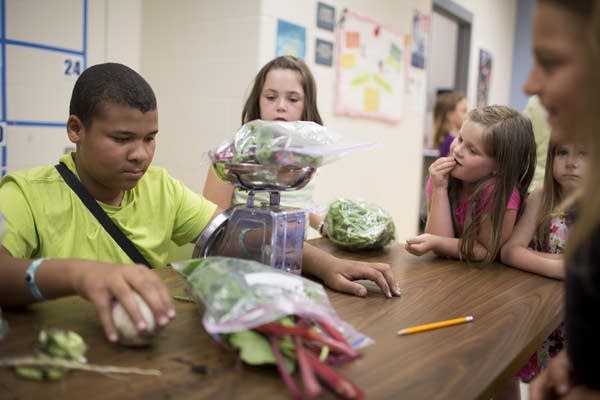Bemidji residents use food to stitch together community

By many measures, Bemidji is thriving.
Five hours north of the Twin Cities, its population of 13,400 has been growing. It is surrounded by lakes and forests and is the biggest city for miles around.
It has a collection of federal, state and regional offices and a state university campus. A new hotel is nearing completion and a recent pipeline project gave the economy a boost. Tourism appears to be recovering from a downturn during the recession. Big box retail stores and supermarkets bring in shoppers from around the region.
• Related: Fighting for an American Countryside
Create a More Connected Minnesota
MPR News is your trusted resource for the news you need. With your support, MPR News brings accessible, courageous journalism and authentic conversation to everyone - free of paywalls and barriers. Your gift makes a difference.
But the area's poverty rate is high, and there's a gulf in relations between whites and American Indians. Twenty percent of the residents of Beltrami County, of which Bemidji is the seat, are American Indians. The county's median income is well below the state figure, and county's poverty rate is nearly 20 percent, well above the state average.
How to deal with that challenge? Some Bemidji residents think part of the answer lies in gardening and food preparation.
The effort is one of the tactics highlighted in MPR News' eBook "Fighting for an American Countryside." One place you can find it is at the Boys and Girls Club, where kids represent all of the area's ethnic groups.

Gardening lets kids get to know one another, said Deb Dilley, who teaches about nutrition for the University of Minnesota Extension service.
"It breaks down some of those racism barriers, which, in Bemidji, some of those barriers are there," Dilley said, watching children chop green beans recently. Bemidji sits amidst three of the state's largest Indian reservations - Red Lake, White Earth and Leech Lake.
But a lot of traditional knowledge about food on those reservations was lost when tribal lands were taken or environmentally degraded and when government commodity food giveaways became common, said JoAnn Mulbah, who teaches about nutrition for the Minnesota Chippewa Tribe.
"It brought up a couple of generations that lost the farming, that lost the gardening, with the spraying and loss of land base, you didn't have the area to grow and go picking," she said.
Mulbah helped plan a community kitchen at the Harmony Natural Foods Co-op in downtown Bemidji.
The facility is a commercial grade kitchen with professional quality appliances.
The goal is to use the kitchen for more than cooking, said kitchen director Lisa Weiskopf, Harmony Natural Foods produce manager.
"It's also about spiritual health and the health of the community and how we relate to one another."

Weiskopf said the kitchen is used every week, most often by nutrition educators demonstrating diabetes prevention recipes. The number of users has remained level for the year and a half the facility has been open. Hourly rates range from as low as $12.50 for cooperative members to $18 for aspiring entrepreneurs.
The Bemidji Brewing Company recently used the kitchen to test recipes for its start-up brewery.
There's also a plan to use the kitchen for a local cable access cooking show whose target audience includes tribal members.
The co-host is Jennifer Jourdain, who lives on the Red Lake Reservation with her family.
She drives 37 miles to the grocery store in Bemidji for fresh foods.
Jourdain says she wants to learn and teach others how to reduce costs and improve diets.
"I've never done my own canning. And different ways of preserving harvest to last throughout the winter because it is such a short growing season here," she said.
The joke in Bemidji is that the growing season is two days out of the three-day summer.

But at the Boys and Girls Club, program director Karl Mork said a strategy to lengthen that is emerging.
The club has built a high tunnel, a steel frame covered with polyurethane plastic catches the northern sunlight, heating the interior and doubling the growing season, Mork said.
The structure was built mid-season last year with a grant from the U. S. Department of Agriculture. Mork and Dilley decided to use raised beds for the plants built to a level that kids can reach and with aisles so young people can walk among them.
They found some additional money to bring in electricity and water to the structure. Mork says a Bemidji grower and educator with several high tunnels is advising them on how to control temperature, pollination and other variables unique to the gardening technique.
The Boys and Girls Club gardening, the Harmony Co-op community kitchen and the area's tribal nutrition education are individual elements with a common goal.
"It is taking it to a way to engage people socially, not only to get good food, but it's another way of engaging people on a community level," Dilley said.


